Blog
Performing for Friday Shabbat Service at Mt Zion in St Paul. 11-15-19 730pm with pre service music at 715pm Visual T’filah (Pulpit Guest: Nancy Brady, Neighborhood House President; Birthday Blessings)
more...A star cluster around 2 million years young surrounded by natal clouds of dust and glowing gas, M16 is also known as The Eagle Nebula. This beautifully detailed portrait of the region was made with groundbased narrow and broadband image data. It includes cosmic sculptures made famous in Hubble Space Telescope close-ups of the starforming complex. Described as elephant trunks or Pillars of Creation, dense, dusty columns rising near the center are light-years in length but are gravitationally contracting to form stars. Energetic radiation from the cluster stars erodes material near the tips, eventually exposing the embedded new stars. Extending from the ridge of bright emission at lower left is another dusty starforming column known as the Fairy of Eagle Nebula. M16 lies about 7,000 light-years away, an easy target for binoculars or small telescopes in a nebula rich part of the sky toward the split constellation Serpens Cauda (the tail of the snake).
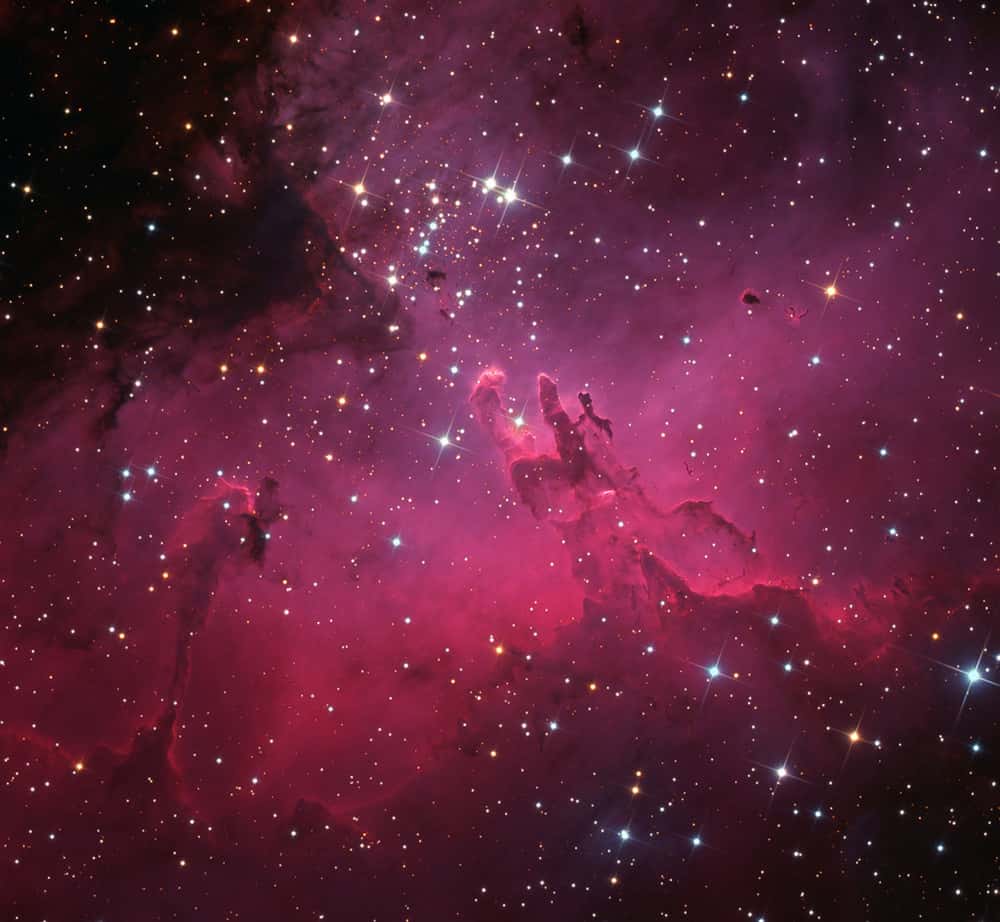
Kevin Tyrone Eubanks (born November 15, 1957) is an American jazz and fusion guitarist and composer. He was the leader of The Tonight Show Band with host Jay Leno from 1995 to 2010. He also led the Primetime Band on the short-lived The Jay Leno Show. Eubanks was born into a musical family. His mother, Vera Eubanks, is a gospel and classical pianist and organist. His uncle, Ray Bryant, was a jazz pianist. His older brother, Robin Eubanks, is a trombonist, and his younger brother Duane Eubanks is a trumpeter. Two cousins are also musicians, the late bassist David Eubanks and the pianist Charles Eubanks. Kevin studied violin and trumpet before settling on the guitar.
As an elementary school student, Eubanks was trained in violin, trumpet, and piano at the Settlement Music School in Philadelphia. He later attended Berklee College of Music in Boston and then moved to New York to begin his professional career.
more...William Edward “Little Willie” John (November 15, 1937 – May 26, 1968) was an American R&B singer who performed in the 1950s and early 1960s. He is best known for his successes on the record charts, with songs such as “All Around the World” (1955), “Need Your Love So Bad” (1956), “Talk to Me, Talk to Me” (1958), “Leave My Kitten Alone” (1960), “Sleep” (1960), and “Fever” (1956). An important figure in R&B music of the 1950s, John was posthumously inducted into the Rock and Roll Hall of Fame in 1996. John was born in Cullendale, Arkansas, United States, one of ten children born to Lillie (née Robinson) and Mertis John. Many sources erroneously give his middle name as Edgar. His family moved to Detroit, Michigan, when he was four, so that his father could find factory work. In the late 1940s, the eldest children, including Willie, formed a gospel singing group. Willie also performed in talent shows, which brought him to the notice of Johnny Otis and, later, the musician and producer Henry Glover. After seeing him sing with the Paul “Hucklebuck” Williams orchestra, Glover signed him to a recording contract with King Records in 1955. He was nicknamed “Little Willie” for his short stature. He was the brother of the singer Mable John, who recorded for Motown and Stax and was member of The Raelettes, the vocal quartette backing Ray Charles; his son Keith John is a backing vocalist for Stevie Wonder.
His first recording, a version of Titus Turner‘s “All Around the World“, was a hit, reaching number 5 on the Billboard R&B chart. He followed up with a string of R&B hits, including the original version of “Need Your Love So Bad“, written by his elder brother Mertis John Jr. One of his biggest hits, “Fever” (1956) (Pop number 24, R&B number 1), was made famous in a cover version recorded by Peggy Lee in 1958, but John’s version sold over one million copies and was awarded a gold disc. Another song, “Talk to Me, Talk to Me“, recorded in 1958, reached number 5 on the R&B chart and number 20 on the Pop chart. It also sold over one million copies. A few years later it was a hit once again in a cover version by Sunny & the Sunglows. John also recorded “I’m Shakin'”, by Rudy Toombs, “Suffering with the Blues”, and “Sleep” (1960, Pop number 13). In all, John made the Billboard Hot 100 a total of fourteen times. A cover version of “Need Your Love So Bad” by Fleetwood Mac was also a hit in Europe. Another of his songs to be covered was “Leave My Kitten Alone” (1959), recorded by The Beatles in 1964 and intended for their Beatles for Sale album. However, the track was not released until 1995.
more...Jerome Richardson (December 25, 1920 – June 23, 2000) was an American jazz musician, tenor saxophonist, and flute player, who also played soprano sax, alto sax, baritone sax, clarinet, bass clarinet, alto flute and piccolo. He played with Charles Mingus, Lionel Hampton, Billy Eckstine the Thad Jones/Mel Lewis Big Band, Kenny Burrell, and later with Earl Hines‘ small band. Richardson was born in Oakland, California, and died in Englewood, New Jersey.
https://www.youtube.com/watch?v=NaUb7r6CLXw
more...Flamenco Fridays featuring Bulerias.
When dancing, you can typically expect one letra to enter with, another letra to “dance to,” and one or two coletillas. (Sometimes there will be more singing, sometimes less.)
Within the structure, it will look something like this:
-
Salida [letra to enter with. Always come in with the singing of a letra.]
-
Marcaje(s) [next letra or coletilla]]
-
Paso de bulerías [letra or coletilla]
-
Llamada [letra or coletilla]
-
Patá [end of letra or coletilla]
-
(Marcaje or Paso de bulerías) [end of letra or coletilla]
-
Llamada [coletilla]
-
Final [coletilla]
Once you begin dancing, the singing never stops. In other words, you will not be abandoned! The singer will continue singing (or giving you jaleos at the least) until have finished your dance. (Learn more about that, and see a video example with Mercedes Ruíz here.)
https://www.youtube.com/watch?v=-Ci7ifHO2hQ
more...Interview with Julian Manzara, Van Nixon and mick laBriola hosted by Steve LeBeau on 11-14-19 in Minneapolis.
https://wccoradio.radio.com/media/audio-channel/synapse-think-tank-air-episode-56-11-14-19?fbclid=IwAR2EDB53ND5Uh9Aw4PC39xH653tbSty8hLeNvCXS7PvcPVet9Myw64bjikM
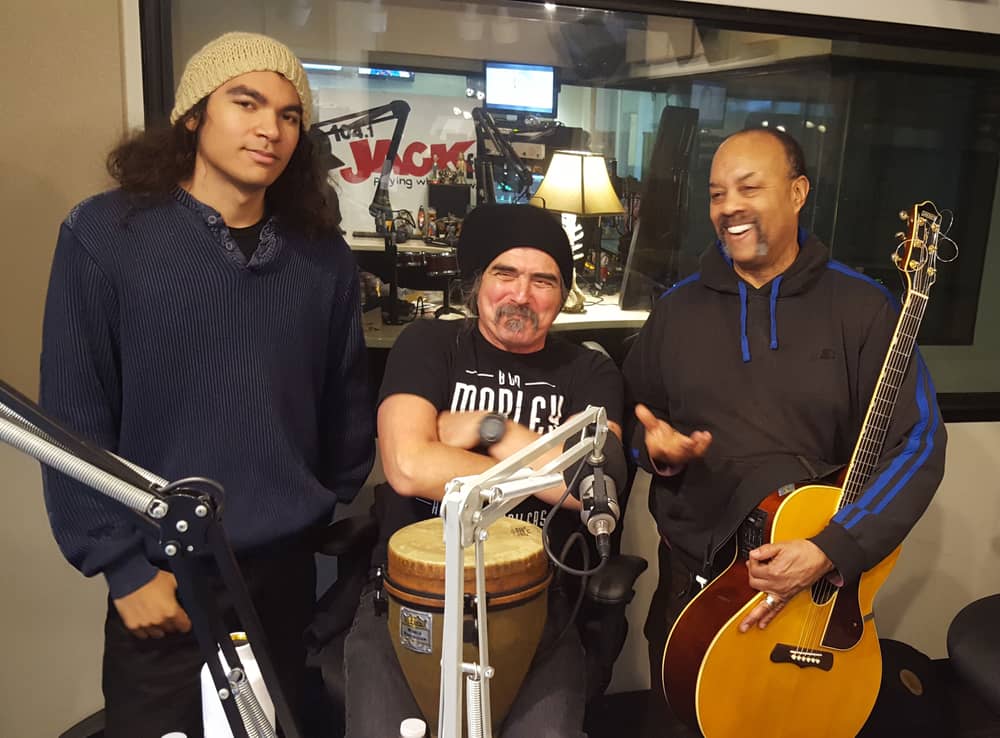
Van Nixon, Julian Manzara and Mick LaBriola will be recording a podcast presentation by my comrade Steve LeBeau from KFAI radio. We were up to no good for year airing our hilarity and insight.
https://wccoradio.radio.com/media/podcast/synapse-podcast
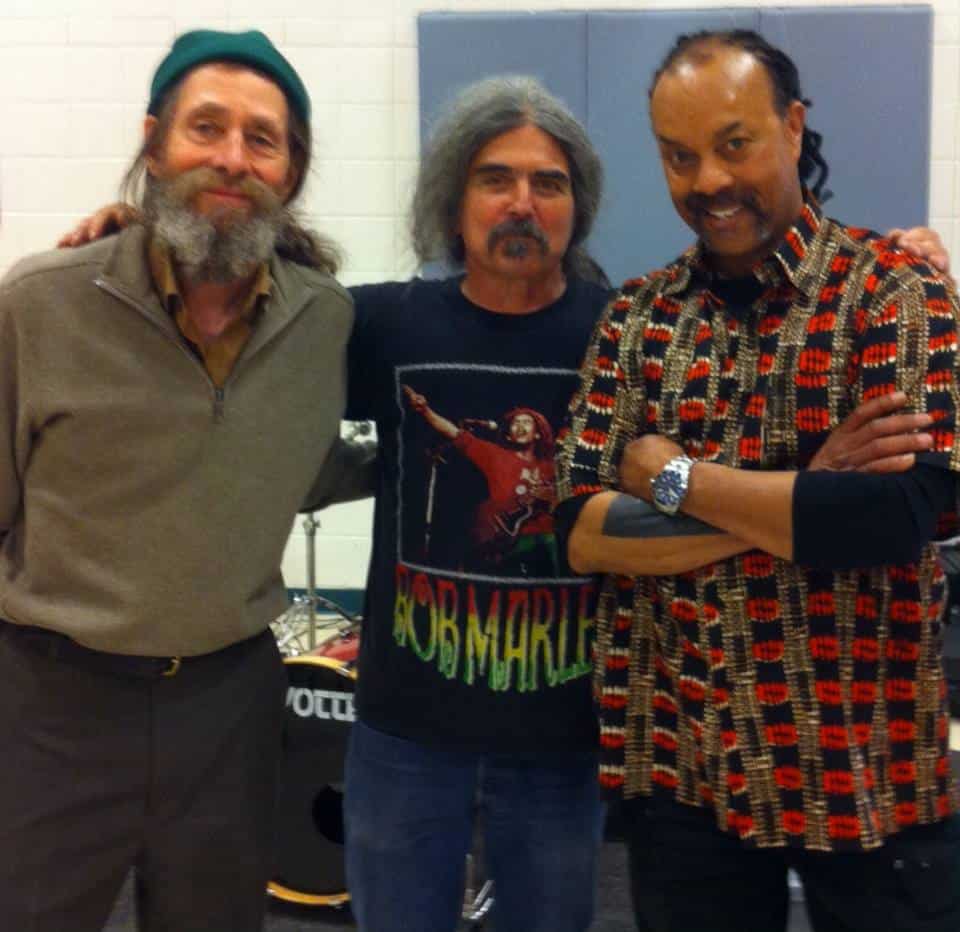
Messier 77 or M77, also known as NGC 1068, is a barred spiral galaxy about 47 million light-years away in the constellation Cetus. Messier 77 was discovered by Pierre Méchain in 1780, who originally described it as a nebula. Méchain then communicated his discovery to Charles Messier, who subsequently listed the object in his catalog. Both Messier and William Herschel described this galaxy as a star cluster. Today, however, the object is known to be a galaxy.
The morphological classification of NGC 1068 in the De Vaucouleurs system is (R)SA(rs)b, where the ‘(R)’ indicates an outer ring-like structure, ‘SA’ denotes a non-barred spiral, ‘(rs)’ means a transitional inner ring/spiral structure, and ‘b’ says the spiral arms are moderately wound. Ann et al. (2015) gave it a class of SAa, suggesting a non-barred spiral galaxy with tightly wound arms. However, infrared images of the inner part of the galaxy reveal a prominent bar feature not seen in visual light, and for this reason it is now considered a barred spiral.
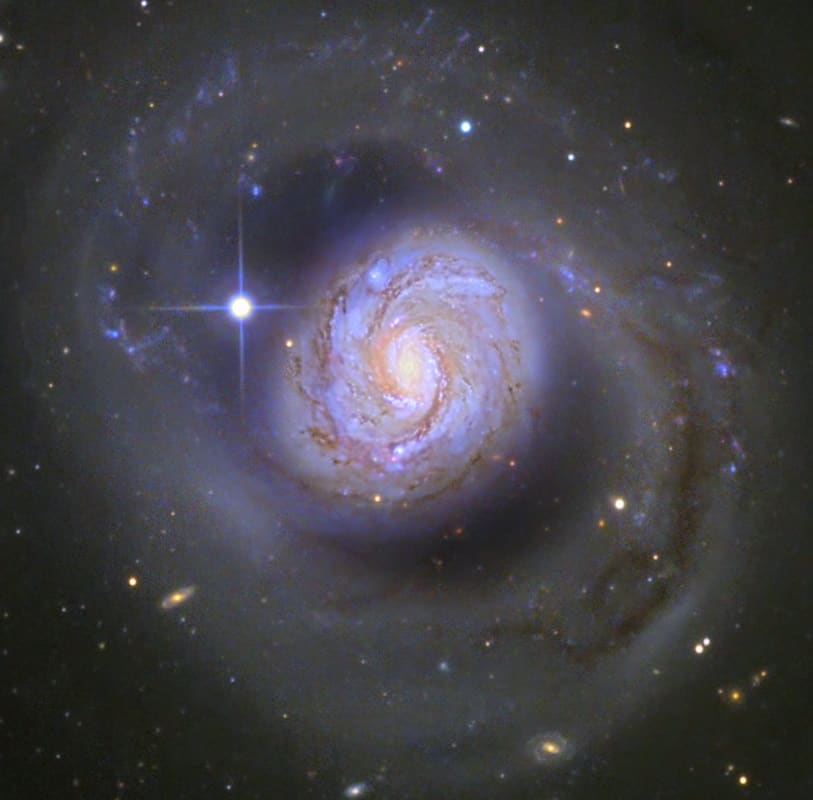
George Andrew Cables (born November 14, 1944) is an American jazz pianist and composer.
Cables was born in New York City on November 14, 1944. He was initially taught piano by his mother. He then studied at the High School of Performing Arts and later at Mannes College (1963–65). He formed the Jazz Samaritans at the age of 18 – a band that included Billy Cobham, Steve Grossman, and Clint Houston.Cables’ early influences on piano were Thelonious Monk and Herbie Hancock. Cables has played with Art Blakey, Sonny Rollins, Dexter Gordon, Art Pepper, Joe Henderson, and many other well-established jazz musicians. His own records include the 1980 Cables’ Vision with Freddie Hubbard among others
more...Ellis Louis Marsalis Jr. (born November 14, 1934) is an American jazz pianist and educator. Active since the late 1940s, Marsalis came to greater attention in the 1980s and 1990s as the patriarch of a musical family, with sons Branford Marsalis and Wynton Marsalis rising to international acclaim.
Born in New Orleans, Louisiana, Marsalis is the son of Florence (née Robertson) and Ellis Marsalis Sr., a businessman and social activist. He and his wife Delores Ferdinand have six sons: Branford Marsalis, Wynton Marsalis, Ellis Marsalis III (1964), Delfeayo Marsalis, Mboya Kinyatta Marsalis (1971), and Jason Marsalis. Branford, Wynton, Delfeayo, and Jason are also jazz musicians. Ellis III is a poet, photographer, and network engineer
Marsalis played saxophone but moved to piano in high school. In the 1950s and ’60s he worked with Ed Blackwell, Cannonball Adderley, Nat Adderley, and Al Hirt. During the 1970s he taught at the New Orleans Center for Creative Arts. His students have included Terence Blanchard, Harry Connick Jr., Donald Harrison, Kent Jordan, Marlon Jordan, and Nicholas Payton.
Though he has recorded almost twenty of his own albums, and was featured on many discs with such musicians as David “Fathead” Newman, Eddie Harris, Marcus Roberts, and Courtney Pine, he shunned the spotlight to focus on teaching. Marsalis’s didactic approach, combined with an interest in philosophy, encourages his students to make discoveries in music on their own, through experiment and very careful listening.
As a leading educator at the New Orleans Center for Creative Arts, the University of New Orleans, and Xavier University of Louisiana, Ellis has influenced the careers of countless musicians, including Terence Blanchard, Harry Connick Jr., Nicholas Payton; as well as his four musician sons: Wynton, Branford, Delfeayo and Jason. In May, 2007, Marsalis received an honorary doctorate from Tulane University for his contributions to jazz and musical education.
more...Aaron Copland (/ˌærən ˈkoʊplənd/; November 14, 1900 – December 2, 1990) was an American composer, composition teacher, writer, and later a conductor of his own and other American music. Copland was referred to by his peers and critics as “the Dean of American Composers”. The open, slowly changing harmonies in much of his music are typical of what many people consider to be the sound of American music, evoking the vast American landscape and pioneer spirit. He is best known for the works he wrote in the 1930s and 1940s in a deliberately accessible style often referred to as “populist” and which the composer labeled his “vernacular” style. Works in this vein include the ballets Appalachian Spring, Billy the Kid and Rodeo, his Fanfare for the Common Man and Third Symphony. In addition to his ballets and orchestral works, he produced music in many other genres, including chamber music, vocal works, opera and film scores.
After some initial studies with composer Rubin Goldmark, Copland traveled to Paris, where he first studied with Isidor Philipp and Paul Vidal, then with noted pedagogue Nadia Boulanger. He studied three years with Boulanger, whose eclectic approach to music inspired his own broad taste. Determined upon his return to the U.S. to make his way as a full-time composer, Copland gave lecture-recitals, wrote works on commission and did some teaching and writing. He found composing orchestral music in the modernist style he had adapted abroad a financially contradictory approach, particularly in light of the Great Depression. He shifted in the mid-1930s to a more accessible musical style which mirrored the German idea of Gebrauchsmusik (“music for use”), music that could serve utilitarian and artistic purposes. During the Depression years, he traveled extensively to Europe, Africa, and Mexico, formed an important friendship with Mexican composer Carlos Chávez and began composing his signature works.
During the late 1940s, Copland became aware that Stravinsky and other fellow composers had begun to study Arnold Schoenberg‘s use of twelve-tone (serial) techniques. After he had been exposed to the works of French composer Pierre Boulez, he incorporated serial techniques into his Piano Quartet (1950), Piano Fantasy (1957), Connotations for orchestra (1961) and Inscape for orchestra (1967). Unlike Schoenberg, Copland used his tone rows in much the same fashion as his tonal material—as sources for melodies and harmonies, rather than as complete statements in their own right, except for crucial events from a structural point of view. From the 1960s onward, Copland’s activities turned more from composing to conducting. He became a frequent guest conductor of orchestras in the U.S. and the UK and made a series of recordings of his music, primarily for Columbia Records.
https://www.youtube.com/watch?v=WVahuS9hk_s
more...Rhythm Roots Workshop Residency final day and performances at Wilder Community Center for Aging. The Great Room group “LA BAMBAS” will perform at 1115am in Great Room and the Day Room group “CONFUSION DELUSION” will perform at 2pm. This will conclude the Residency. However there may be a future performance TBA.
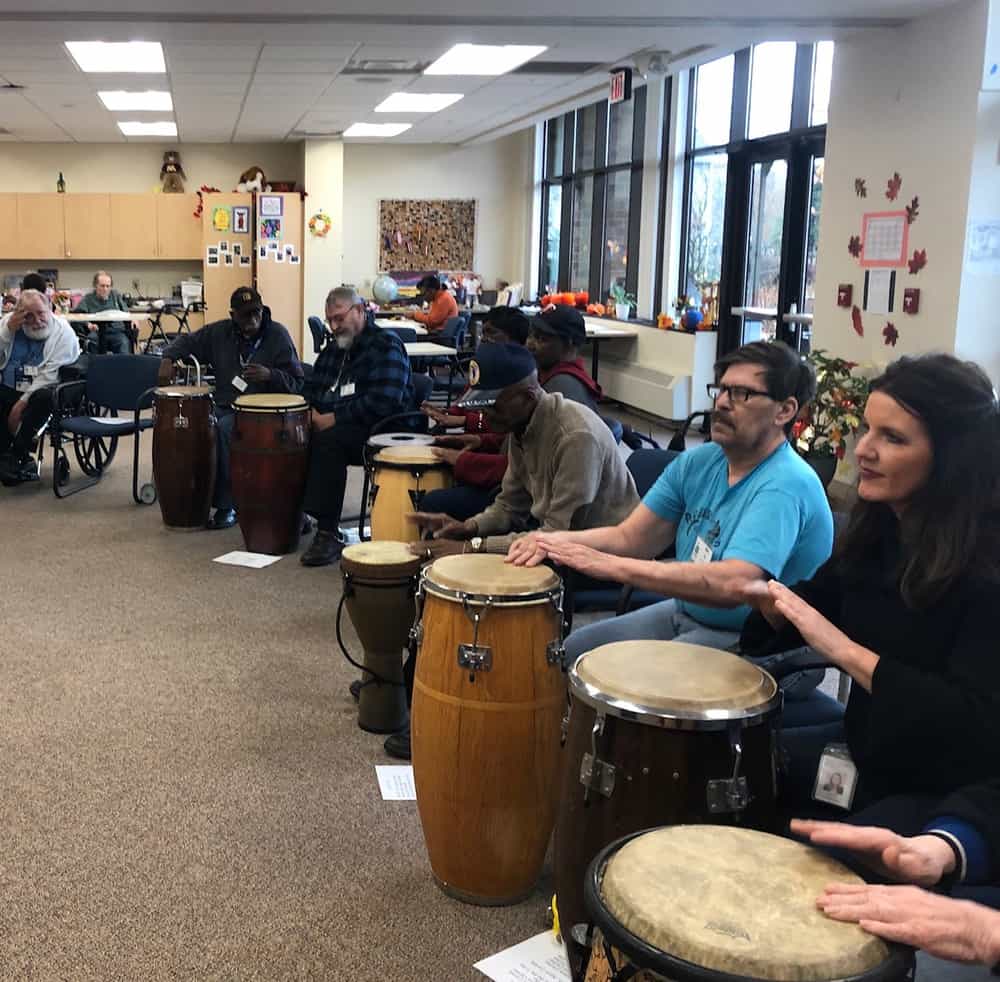
more...
NGC 1706 is a spiral galaxy located approximately 227 million light-years from Earth. Also referred to as ESO 85-7 and LEDA 16220, the galaxy is seen face-on toward the constellation of Dorado. NGC 1706 was discovered on December 25, 1837 by the British astronomer John Herschel. It belongs to the LDC357 group, a small gathering of galaxies which are gravitationally bound and hence relatively close to each other. “Around half of the galaxies we know of in the Universe belong to some kind of group, making them incredibly common cosmic structures,” the Hubble astronomers said. “Our home galaxy, the Milky Way, belongs to the Local Group, which also contains the Andromeda Galaxy, the Large and Small Magellanic Clouds, and the Triangulum Galaxy.” “Groups are the smallest of galactic gatherings,” the researchers added. “Others are clusters, which can comprise hundreds of thousands of galaxies bound loosely together by gravity, and subsequent superclusters, which bring together numerous clusters into a single entity.”
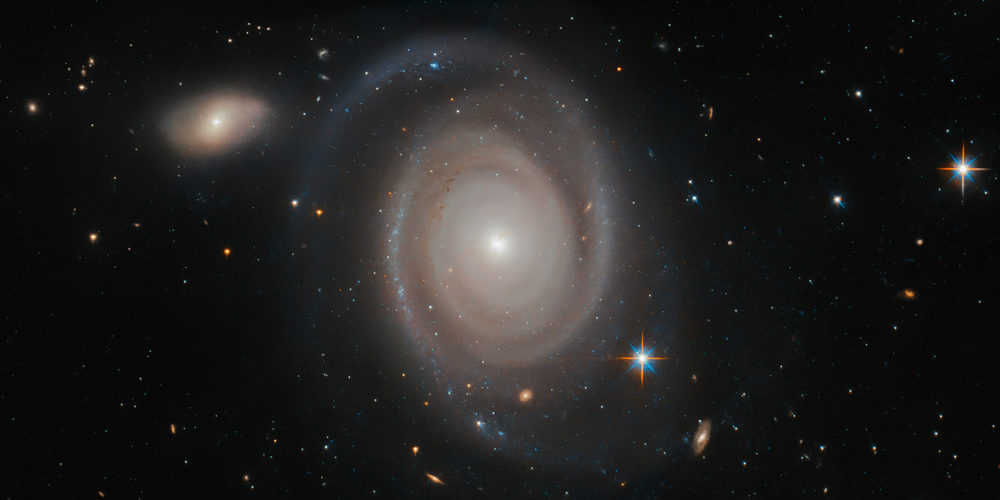
Idris Muhammad (Arabic: إدريس محمد; born Leo Morris; November 13, 1939 – July 29, 2014) was an American jazz drummer who recorded with Ahmad Jamal, Lou Donaldson, Pharoah Sanders, and Tete Montoliu.
Born Leo Morris in New Orleans, he grew up in the city’s 13th Ward. He showed early talent as a percussionist and began his professional career while still a teenager, playing on Fats Domino’s “Blueberry Hill“.
He toured with Sam Cooke, and later worked with Jerry Butler and Curtis Mayfield, mostly working in R&B until the mid-1960s, before going on to work more frequently in jazz. Muhammad was an endorser of Istanbul Agop Cymbals. He died aged 74 in 2014.
more...Hampton Barnett Hawes, Jr. (November 13, 1928 – May 22, 1977) was an American jazz pianist. He was the author of the memoir Raise Up Off Me, which won the Deems-Taylor Award for music writing in 1975. Hampton Hawes was born on November 13, 1928, in Los Angeles, California. His father, Hampton Hawes, Sr., was minister of Westminster Presbyterian Church in Los Angeles. His mother, the former Gertrude Holman, was Westminster’s church pianist. Hawes’ first experience with the piano was as a toddler sitting on his mother’s lap while she practiced. He was reportedly able to pick out fairly complex tunes by the age of three.
Hawes was self-taught; by his teens he was playing with the leading jazz musicians on the West Coast, including Dexter Gordon, Wardell Gray, Art Pepper, Shorty Rogers, and Teddy Edwards. His second professional job, at 18, was playing for eight months with the Howard McGhee Quintet at the Hi De Ho Club, in a group that included Charlie Parker. By late 1947, Hawes’ reputation was leading to studio recording work. Early studio dates included work for George L. “Happy” Johnson, Teddy Edwards, Sonny Criss, and Shorty Rogers. From 1948 to 1952, he was recorded live on several occasions at Los Angeles-area jazz clubs including The Haig, The Lighthouse, and The Surf Club. By December of 1952, he had recorded eight songs under his own name for Prestige Records with a quartet featuring Larry Bunker on vibraphone.
After serving in the U.S. Army in Japan from 1952 to 1954, Hawes formed his own trio, with bassist Red Mitchell and drummer Chuck Thompson. The three-record Trio sessions made by this group in 1955 on Contemporary Records were considered some of the finest records to come out of the West Coast at the time.[citation needed] The next year, Hawes added guitarist Jim Hall for the All Night Sessions. These were three records made during a non-stop overnight recording session.
After a six-month national tour in 1956, Hawes won the “New Star of the Year” award in Down Beat magazine, and “Arrival of the Year” in Metronome. The following year, he recorded in New York City with Charles Mingus on the album Mingus Three (Jubilee, 1957).
Benjamin “Bennie” Moten (November 13, 1894 – April 2, 1935) was an American jazz pianist and band leader born and raised in Kansas City, Missouri.
He led the Kansas City Orchestra, the most important of the regional, blues-based orchestras active in the Midwest in the 1920s, and helped to develop the riffing style that would come to define many of the 1930s Big Bands.
Moten started making music from an early age and developed as a pianist, pulling together other musicians in a band. His first recordings were made (for OKeh Records) on September 23, 1923, and were rather typical interpretations of the New Orleans style of King Oliver and others. They also showed the influence of the ragtime that was still popular in the area, as well as the stomping beat for which his band was famous. These OKeh sides (recorded 1923–1925) are some of the more valuable acoustic jazz 78s of the era; they are treasured records in many serious jazz collections.
They signed with Victor Records in 1926, and were influenced by the more sophisticated style of Fletcher Henderson. More often than not, their pieces featured a hard stomp beat that was extremely popular in Kansas City. Moten continued to be one of Victor’s most popular orchestras through 1930. Their song “Kansas City Shuffle” was recorded during this time. (The band recorded prolifically, and many of their records were issued in Victor’s regular series, not specifically marketed to the Black community as some other bands were.)
more...More Posts
- Mike Stern Day
- Max Roach Day
- World Music with Juluka
- Daily Roots with Ken Boothe
- The Cosmos with NGC 5584
- Joan Baez Day
- Bucky Pizzarelli Day
- Kenny Clarke Day
- World Music with Katalena
- Daily Roots with the Classics
- The Cosmos with M45
- Dave Weckl Day
- David Bowie Day
- Elvis Presley Day
- Tampa Red Day
- World Music with Sukar
- Daily Roots with Duke Morgan
- The Cosmos with NGC 7217
- Kenny Loggins Day
- Chano Pozo Day